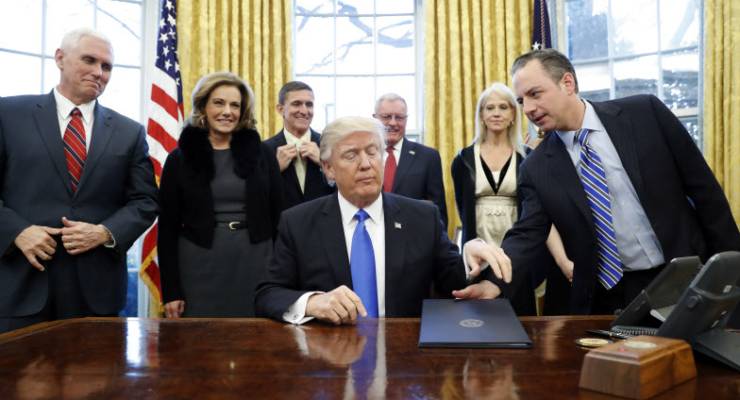
Watching the events of the weekend in the United States was like viewing 20 years of Australian border control policy on fast forward. The spectacle at airports across the United States did not result from the election of a uniquely tyrannical government. Rather, it is what happens when measures that have been introduced incrementally in Australia are imposed overnight. Configuring immigration as a national security issue, introducing religious discrimination into the refugee intake — Australia was there first.
Aussie Aussie Aussie, oi oi oi.
The difference is that while successive Australian governments have used dog-whistle politics (a term, of course, adopted from the United States) to provide racist immigration policies with a thin veneer of respectability, Trump has gone for shock and awe.
Even though they had been foreshadowed for months, Trump’s measures to subject Muslims seeking to enter the United States to “extreme vetting” still seemed shockingly sudden. The unpredictability of the presidential executive orders only heightens their power. The sense of panic and crisis as travellers (including green card holders) were turned back in the middle of their journeys or incarcerated upon arrival will be a more effective deterrent than any wall against not only migration to the United States, but also travel of any kind.
This applies not only to members of the nationalities listed in the executive order, but to members of any group towards which the POTUS has expressed animosity. (Terrorists, on the other hand, are unlikely to be so easily persuaded to change their minds. In fact, if anything is likely to lessen the attractiveness of the United States as a terrorist target, it is more likely to be the prospect satirised by The Onion in an article headlined “FBI Uncovers Al-Qaeda Plot To Just Sit Back And Enjoy Collapse Of United States”. Why bother to set fire to a house that is already ablaze?)
Indian and Pakistani media outlets are reporting on an interview in which White House chief of staff Reince Priebus told CBS: “You can point to other countries that have similar problems like Pakistan and others — perhaps we need to take it further.”
I am Australian-born and have never held citizenship of any other nation, but given my surname, my Pakistani ancestry and the Pakistani visas in my passport (not to mention past uncomfortable interviews with US border control), I would be very fearful of travel to the United States under the current administration. Many other Australian citizens would hold similar fears. These fears are heightened by the Turnbull government’s apparent determination to maintain the deal to resettle refuges from Nauru, no matter the cost. It is difficult to trust that a government that wants to be on such friendly terms with Trump would be prepared to adequately represent our interests, if and when we should need consular support.
And it is also difficult to regard the United States as a safe and friendly destination for traumatised refugees from Muslim-majority societies. But then, it is increasingly difficult to regard Australia in that light, either.








Nah we can’t blame Australia. HE is a white neofascist racist, we did not make him that way.
Scott Morrison reckons we helped pave the way for Trump, and Morrison should know, he was, still is, a paver-in-chief.
We Run Concentration Camps.
So hard to tell sarcasm in the written word …
As the PM commented today triumpily; ‘we Australians are the ones who showed the world how to secure borders.’ (and locate, construct, introduce extra territorial legal, management entities that permit deniability no matter what the question or outcome, including deaths in custody.) Ooh Yes! Australia has lit the path for all to follow.
We are of course just a little bit worried since stage right entrance of President Trump . . . . whether our deniability clause will be entirely adequate for the immediate future whilst we sort out which bloc we really want to be allied (subservient) to.
Yep, Al-Qaeda and IS would be declaring a holiday over their victory in Australia, Britain and the US: no chance of tolerance of brown people with their funny languages and culture now! But sadly it radiates out undermining tolerance in otherwise “moderate” Muslim majority countries. Here in SE Asia, radical groups run by guys with no more morals than Trump are free to use the race/religion card to further their political aims precisely because the West has proven itself to be such a hollow man.
Easy, no Australians go to USA and muck up their tourism industry, especially if other countries do the same.
The constant theme in the Benighted States, since the 19thC, has beenn Isolationism – Yay or Nay?
I have heard the claim that this is a threat or danger in every election since I became sentient (with the exception of Obama) and my only thought was “PLEEZ, pleez do so!”.
If the Drumpfster builds a southern wall, Canada would probably buried in crowd funding to build a northern wall and the rest of the world could chip in for the roof.
Leave them to stew in their own shitty stupidity.